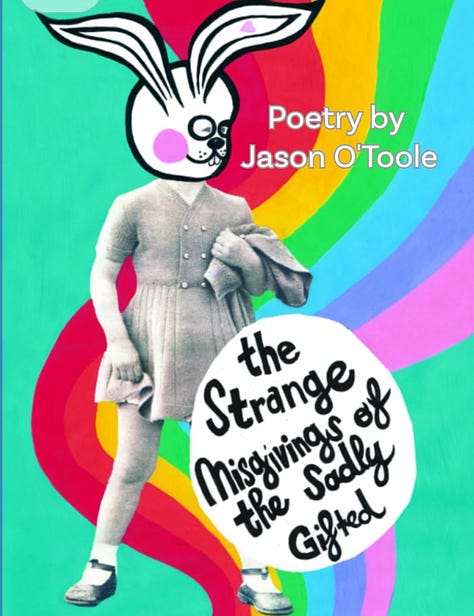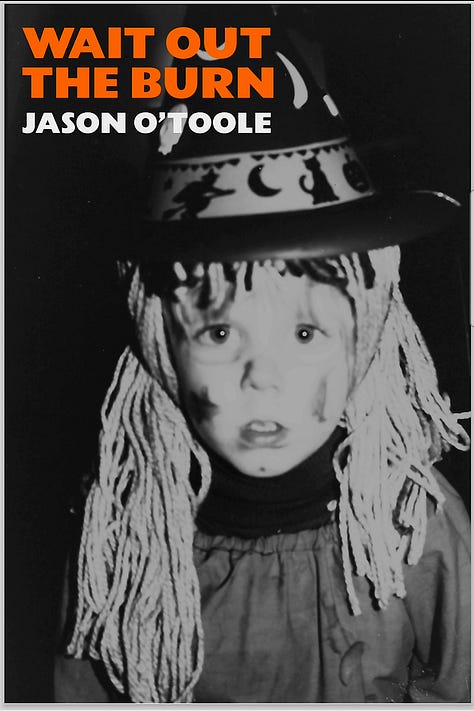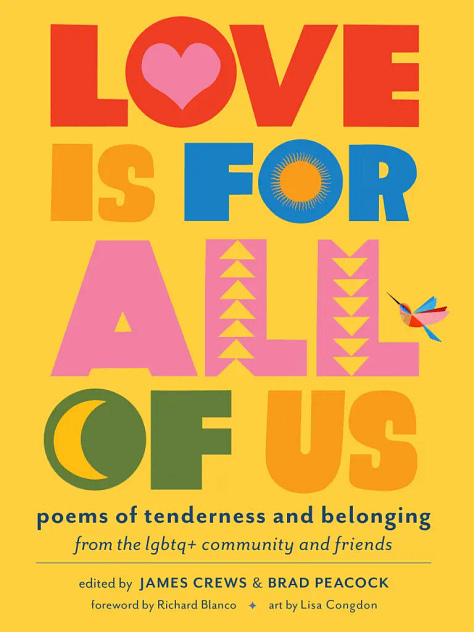"When a poem is 'finished' it feels like a temple bell is rung, vibrating in my chest," poet Jason M. O'Toole.
an interview on process + poems.
poetic musings
I love the way that Jason's poems tend to unfold, revealing a layer of emotional depth and meaning with each read that drops deeper and deeper into my body and awareness. For a self-identified logical guy, he writes from a position of unerring intuition and is enviably, wildly prolific. It’s been a delight to connect with him; he’s been a spark for creative focus and clarity.
You can download his latest chapbook of protest poems, Wait Out the Burn (Ghost City Press), for free with an option to donate directly to him or purchase his recent collection, The Strange Misgivings of the Sadly Gifted (Dead Man’s Press Ink), a collaborative collection with his son who died suddenly in 2021, whose drawings accompany Jason’s poems.
with limitless gratitude,



Jason O’Toole is Poet Laureate Emeritus of North Andover, MA. He serves on the advisory board of the New England Poetry Club and as treasurer of the Independent Living Resource Center San Francisco. His newest full collection is The Strange Misgivings of the Sadly Gifted (Dead Man’s Press Ink).
How do you get inside a moment that becomes a poem? How do you know when a piece has come together/is finished? Does it feel a particular kind of way in your body?
Sometimes I feel a rhythm or hear a melody, and the words drop in over time. Other times, I will hear a phrase in my head and write it down—and if it’s especially evocative a poem builds around it. Either driving or being in water are conducive to being in the right headspace for poems to form.
That might be as simple as taking a shower and clearing my head, or swimming in a peaceful lake with loons, swimming against a river current trying to make sure I don’t get swept under, or chest deep in the ocean on the lookout for sharks. Sharks figure in my dreams and some poems as I spend an inordinate amount of time tempting fate in the Ocean.
When a poem is “finished” it feels like a temple bell is rung, vibrating in my chest—or like strumming a guitar chord after you’ve tuned up.
Hermetics
by Jason O’Toole1
Do not think of here And there. Think of here to there, and back again. Time is a circle, says Nietzsche, Be an optimist, a realist, but never a nihilist. There is no demarcation where light ends and darkness begins. Eternally is here, croons Jeffrey Lee, dead, yet rambling. As above, so below – an effervescent spectrum. Here, there, and everywhere sing the alchemical Beatles, two now dead, yet everywhere. omnipresent, immortal – bullets and cancer, notwithstanding. Am I with you, my son, in eternity, though linear time is all I see? There are more colors in the rainbow than stars in the sky.
You dreamt the title for Strange Misgivings. How do some of your works come from dreams?
I’ve woken with entire poems or songs written in my head—and a handful of times have read them just like reading a book in waking life. Usually, books and signs in dreams are a hallucinatory jumble like bad AI Art. The title of my collection The Strange Misgivings of the Sadly Gifted came to me in a dream—I met an older man who was supposed to be me—and he handed me a book with that title with a cover by my friend Sara Lucas (Hello the Mushroom). I said “That’s a great title,” and the old man said, “Ya think!?”—then I saw that the book was mine. Sara wound up painting the cover art.
You’ve been writing poems since you were young. Tell us more.
My fourth-grade teacher Mrs. Everett at the Albany Academy for Boys had us memorize and recite poems. I found that I had a talent for it. I recall learning Carl Sandburg, Robert Frost, and Longfellow at school, then devouring poetry books my family had at home—e.e. cummings, A.E. Housman, Yeats, T.S. Eliot, and Dylan Thomas. My dad was a folkie, and Pete Seeger, Woody Guthrie, Bob Dylan and Irish rebel songs were always on the stereo. I met Pete many times and got to hear him play, even sailed with him on his sloop, The Clearwater.
Clearwater
by Jason O’Toole2
Indian summer day aboard Pete Seeger’s sloop. Net is cast into the Hudson flop onto deck three eels, saturated with PCBs oozing into river from General Electric capacitor plants north of Albany. Pete is angry, for these American eels. He will not live to see the dredging of this poison, thirty years off. Sky above sails fills with plumes of acid smoke, burns the wings of moths & wildflower petals. This sloop named Clearwater, as a child I grasp hopefulness versus dreadful odds. I know smallness. I don’t yet know futility.
My grandparents had artist friends with a library full of the Beats, so I discovered Burroughs, Kerouac, Ginsberg, Corso, and others before I was even 13, and attended some of Ginsberg and Anne Waldman’s readings. When I found out who influenced my favorite poets, I read those, too, and discovered William Carlos Williams, Pablo Neruda, HD, Ezra Pound, and in my teens, went through a Rimbaud phase.
I really enjoyed rap and hip hop when that hit NY—and bought some of the first singles as they came out, along with mix tapes off the street. Kurtis Blow, Melle Mel, and later on, Chuck D and KRS-One lyrics meant a lot to me. Punk, New Wave, and No Wave were a big influence as soon as I heard that on college radio in the late 70s. I was attending a few concerts and shows by 1980 or 1981, and helping to organize all-ages shows by 1985. Most of those lyrics were low effort, but Patti Smith, Television, The Clash, The Jam, The Gun Club, X, The Birthday Party, Swans, Minutemen, Sonic Youth, and Gang of Four made me think. I played in some NY bands as well, and some of my lyrics were better than others, but I was going for effect and volume more than anything.
The first poems that I shared outside of school lit mags, which were a bit compulsory, were in punk and art zines starting around when I was 15 years old, such as this one, which ran in a little photocopied zine I put out with Sam McPheeters:
I Left
Jason O’Toole3
I left the window open In flew an angel of death He said Hello, I will come back when you are done. I said Can I have your number? It was on my head I could read it in the mirror The mirror turned black & cracked Then the angel grabbed me by my throat and said I will be back. I closed the goddamn window
invitation to guest post
I love honoring you, honoring your practices of all kinds, from the unhurried practice of baking sourdough bread to the dedicated practice of relearning to read after cognitive disability. Won’t you share them with me? unraveling, unmoored will soon be hearing from book artist, researcher, and educator Isabella Myers. Guidelines can be found on the About Page. Please message or email with questions.
for another poem by Jason, click on Where is my mind?
unraveling, unmoored thrives on reader support; without you, we wouldn’t be here. We’d be somewhere else looking for you. We’d love to connect with more like-minded poets, artists, and practicing souls, and you can help us find them by talking us up in all of your digital and analog spaces and sharing this post with everyone you’ve ever met.
If this piece inspired you or otherwise spoke to you, consider upgrading to a yearly subscription or sending a one-time tip to unraveling, unmoored.
“Hermetics” first appeared in Another Chicago Magazine (2023) and is included in the collection The Strange Misgivings of the Sadly Gifted (Dead Man’s Press Ink).
“Clearwater” first appeared in Neuro Logical (2019) and is also included in the collection The Strange Misgivings of the Sadly Gifted (Dead Man’s Press Ink).
“I Left” first appeared in That Wretch’d Magazine (1984).







